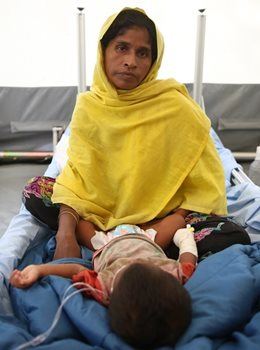By Angela Hill, Canadian Red Cross
Inside the isolation tents at the Red Cross Red Crescent field hospital in Bangladesh, the air is still. Six kids fight measles, although at some points over the past weeks nearly all 20 beds have been filled at once. Little lungs work to fill as respiratory tract infections are the hallmark of this disease.
 |
|
A mom watches over her baby in the isolation tent at the Red Cross Red Crescent field hospital in Bangladesh. Parents of children with measles support each other as they wait for fevers to lessen and breathing to get easier.
|
“They all came before they got the rash,” said Birte Abild, of the telltale red rash that starts on the face before covering the child’s body. Abild is a ward nurse from Norway who is in charge of the isolation unit.
There is no antiviral medication to combat the measles virus, but hospital staff provide essential treatments to address the complications of this often-deadly disease. Antibiotics are used to treat secondary infections, usually of the lungs, eyes and skin; vitamin A supplementation is given to ward off potential blindness; oxygen may be necessary to enable easier breathing and high fevers are managed using Tylenol and cool baths.
“They are dehydrated and most of them are malnourished and that’s not a good thing when you get sick,” Abild said. Globally, measles remains a leading cause of death in children under the age of five, and the risk of death increases markedly in cases where the child is malnourished.
A few children arrived at the hospital far too late to help, some of them died in the outpatient department. It’s hard for staff, seeing children die from a disease that is prevented by a vaccine, Abild said.
Until recently only 36 per cent of the target population, children 6 months to 15 years, were covered by vaccine, said Dr. Mausam Bohara, surge health lead for the International Federation of Red Cross, Red Crescent.
This is changing. A mass vaccination campaign is underway and social mobilization teams are talking to people about measles, prevention and hygiene promotion.
However, Bohara thinks things will get worse before they get better. Measles is highly infectious, and it has a high case fatality rate in vulnerable populations living in a camp setting such as this.
“It’s major because it can really rapidly spread,” she said. “It’s so much associated with a crowded living condition and especially if you walk around in the camps, it’s all kids, so they are more prone to getting it.”
Canadian mobile medical teams are playing a big role, identifying cases out in the community far from care and making sure the children get to the hospital. There they receive treatment in the isolation tents.
“Of course, we then hope they go out and tell the others, if you have a child is sick, you should come here,” Abild said.
Learn more about the work of the Red Cross Red Crescent in Bangladesh.
This work is made possible in part thanks to support from the Government of Canada.
The Red Cross Red Crescent is working to ease the suffering of people who have fled their homes in pursuit of safety from the ongoing violence in Rakhine in Myanmar. Red Cross staff and volunteers are on the ground assisting as people move into camps, settlements and host communities both in the near term and in the future as the situation evolves.